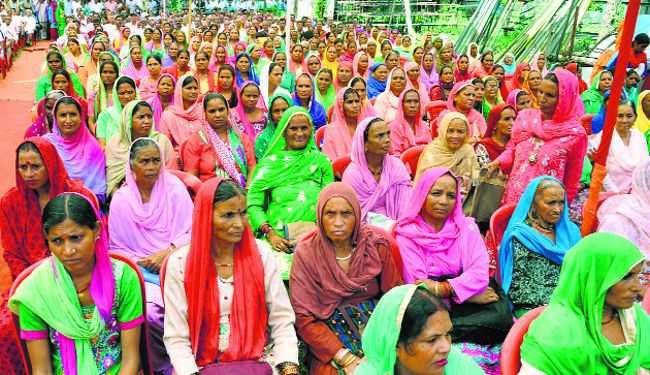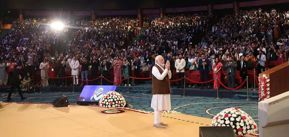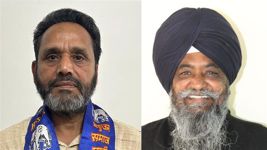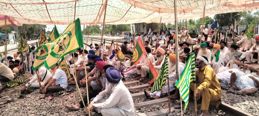
OBC members attend the Girth Bahati Chang sabha meeting at Mandal village near Dharamsala. File photo: Kamaljeet
Lalit Mohan
With the parliamentary elections due in Himachal on May 19, caste weighs heavily on the minds of political strategists of both the Congress and the BJP.
Though the Constitution of India legislates against caste system, caste looms large over the election process in the country even after more than 71 years of independence. Society is still divided and caste is an important factor in political strategy of parties. Probable candidates are also playing the caste card to stake claim to party tickets and are putting forward the names of other leaders.
In BJP, Trilok Kapoor, the national vice-president of ST Morcha, has launched an aggressive campaign for a party ticket from Kangra parliamentary constituency. Kapoor has been claiming ticket on the plea that Gaddi community, listed under the Scheduled Tribe category in Himachal Pradesh, has a sizable number in Kangra parliamentary seat. Kapoor even went to the extent of getting a campaign launched against Shanta Kumar, a veteran BJP leader, former CM and sitting BJP MP from Kangra, over a statement allegedly made by him regarding the Gaddi community. Shanta Kumar denied issuing any such statement, but still had to issue an apology to assuage the feelings of the Gaddis of Kangra, especially ahead of the elections.
In Hamirpur, Anurag Thakur, the sitting BJP MP, has consecutively won three times and is a Rajput by caste. A strong section of the Congress leaders from the state are suggesting the name of CLP leader Mukesh Agnihotri as the party candidate from Hamirpur parliamentary constituency. The Congress leaders are pushing for Agnihotri’s name on the plea that he is a Brahmin. Brahmins form a sizable chunk of the electorate in Hamirpur parliamentary seat and so, the Congress leaders claim that only Agnihotri can put up a formidable challenge to Anurag Thakur. The BJP dominated the Hamirpur parliamentary constituency and the Congress has not won since 1988. Agnihotri on the other hand was reluctant in contesting from Hamirpur on the plea that the seat had always been won by candidates from the Rajput caste.
In Congress, Kangra MLA Pawan Kajal is eying a party ticket as OBCs constituted about 32 per cent of the total electorate in Kangra constituency.
With the elections drawing near, caste affiliations are being put to use by probable candidates and their supporters. Kinships and caste equations are being used as strategies to garner votes.
Caste plays a prominent role, at least in the election strategies of candidates in Kangra, which is politically most significant district of the state. The data on election, however, reveals a different story.
Sources said Rajputs are in a majority in the Kangra district. Rajputs constitute about 34 per cent of the total electorate in Kangra. OBCs follow them closely at about 32 per cent and Brahmins comprise about 20 per cent of the electorate. The remaining 14 per cent are Gaddi and Gujjar tribals and members of the Scheduled Caste community. According to sources, the parties are also trying to strike a balance among various castes in the distribution of tickets. Efforts are being made to give due representation to the Rajput, Brahmin, OBC and Gaddi leaders in Kangra that decide the political fortunes in state.
Shiv Pal, a Rajput leader form Jaisinghpur area, said caste does matter in elections, as strong family ties and kinship helps in elections. We are approached by relatives and caste bodies to vote in favour of particular candidates, he said. Vikas Sharma, a septuagenarian, said: “No matter how much we negate caste, it is still important. Most of the Brahmins in Himachal consider Shanta Kumar as their tallest leader and generally polarise behind him.” Congress does not have any prominent Rajput leader in Kangra district. The only Rajput leader in Congress was Sujan Singh Pathania, former agriculture minister. He, however, focuses on his own Assembly constituency and does not have a pan-Kangra following. Vijay Singh Mankotia used to be a strong Rajput leader, but he has been pushed to the sidelines by the Congress party. Former Chief Minister Virbhadra Singh is the lone Rajput leader of the Congress, who can influence the Rajputs in Kangra.
The BJP on the other hand has a comparatively stronger Rajput leadership in Kangra. Former minister Ravinder Ravi and former MLA Rakesh Pathania are prominent Rajput leaders in the BJP from Kangra, who also claim to hold a sway over the Rajput vote bank in the district. Besides, Rajputs also consider former CM Prem Kumar Dhumal as their leader. Shanta Kumar is the tallest Brahmin leader in the state and still holds a sway over the Brahmin vote bank in the state. During the last parliamentary elections, a slogan ‘ab ki bari bare panditji’ (this time it would be elder panditji) was doing the rounds that indicated how caste plays a prominent role.
The slogan was coined in favour of Shanta Kumar, the sitting BJP MP from Kangra. Though the leaders are heavily relying on caste equations, the past elections have shown that personal relations of candidates and performance as leaders also play a crucial role. In Kangra parliamentary constituency, even Sat Mahajan had won the parliamentary election from Kangra in 1996 despite the fact that his caste had a marginal presence in the area. He also consistently won from Nurpur Assembly constituency despite the fact that Rajputs dominate the area. Vikram Chand Mahajan had won from Kangra parliamentary in 1980 and 1971.
Similarly, Nagrota Bagwan is an Assembly constituency dominated by OBC voters. It has about 52 per cent OBC voters, but still Bali, a Brahmin, has been winning from the area consecutively (four times). GS Bali won on the basis of development carried by him in the area and his personal relations with the electorate. In 2012 Assembly elections, Sudhir Sharma, a Brahmin, managed to defeat Kishan Kapoor, a Gaddi leader, in Dharamsala despite the strong presence of the community in the area. Virbhadra Singh tried to play caste politics during his last stint as the CM. He created welfare boards for almost all castes including, Brahmin Welfare Board, Rajput Welfare Board, Gaddi Welfare Board and Gujjar Welfare Board. Even though the boards were constituted, they could not garner votes for him as the Congress lost miserably in Kangra. It lost 11 of 15 Assembly segments.
Castes in Kangra as per Kangra Gazetteer compiled by the British
As per the Kangra Gazetteer compiled by the British in 1924-25, castes were static and their status in society kept on changing as per their economic status. As per the Settlement Report of the then Settlement Officer of Kangra, Sir JB Lyall: “In Kangra, limits of caste do not seem to immutably be fixed in the hills as in the plains. The Raja was the fountain of honour and could do much as he liked. There were instances, when Raja used to promote a Girth to be a Rathi and Thakur to be a Rajput for some service done or money given.”
The Gazetteer lists castes as 1st grade Brahmins and 2nd grade Brahmins, 1st grade Rajputs and 2nd grade Rajput. There were grades even in the lower castes.
The Gazetteer lists that even the Gaddi community was divided into Brahmins, Bhats, Rajputs, Khatris, Thakurs and Rajputs. In Gaddi community, Khatris are not traders or shopkeepers like those of the same caste in the plains or other communities. They are the best class of Gaddis and most of them are best shepherds and the richest and most influential men as per the Gazetteer.
Since castes were further divided into groups and sub-groups and on the basis of economic status, the idea of the polarisation of entire caste group towards one political party or candidate seems to be a utopia.
‘People do follow caste patterns’
As a social scientist, I have studied the caste phenomena in Indian politics. Under general circumstances, people do follow caste patterns in voting. However, in extraordinary circumstances, as during emergency in 1975 to 1977, people left all caste and other considerations and voted as a unit. Similarly, after the assassination of Indira Gandhi, the entire country polarised behind the Congress. In 2014, the majority of the country was polarised behind current PM Narendra Modi and caste-based parties became irrelevant. So, we can say that under normal circumstances, the Indian electorate might be swayed by caste groups, but under extraordinary circumstances, the people of India act as a unit. — Kuldeep Agnihotri, VC, Central University Himachal Pradesh
‘Society getting more and more divided’
Though it is unfortunate and the Constitution does not provide for it, society is getting more and more divided. Not only individual candidates, but parties, too, are dividing voters. There are many parties whose foundation is caste. In such a scenario, if one says that caste is no more relevant, it will be like closing eyes to reality. In Himachal also, parties take caste into consideration while selecting candidates during Assembly as well as parliamentary elections. It is unfortunate that when the country should have been progressing, our society is getting deeper divisions on the basis of caste. — Vijay Singh Mankotia, Former minister and a prominent Rajput leader
‘Relevant specially among upper castes’
Caste still is relevant especially among the upper castes. All Brahmins voted for Shanta Kumar last time. There were about 18 to 20 Bhatolis of Brahmins in my constituency (Jawali). I got just 10% votes and most of the Brahmins voted for Shanta Kumar. Caste polarisation is not that common in OBCs. Though there are about 32% OBCs in Kangra, they didn’t ever polarise after a single candidate. OBCs in Kangra vote on party lines and personal affiliation to leaders than the candidate of their community. — Chander Kumar, former MP and prominent OBC leader from Kangra
‘Not relevant anymore in electoral politics’
Only those leaders talk of dividing people on caste lines, who do not have a vision. Young voters are voting for good governance and performance of candidates. Had it been for caste polarisation, only the representatives of dominant castes would have won. The Congress advocates secular politics. People who do politics on the basis of caste and religion cannot last long. We saw in UP that parties relying only on caste for votes were decimated. Though some politicians still talk of caste, I do not think that it is relevant anymore in electoral politics.— Sudhir Sharma, Former minister and Brahmin leader from Kangra
‘Youth more oriented towards performance ’
Issues such as caste are irrelevant to young voters. The youth are more oriented towards the performance of candidates and governments. However, for leaders and political parties, caste still holds relevance. A caste is taken into consideration by parties while deciding their candidates. The persistent demand of certain political parties to arouse caste sentiment by demand for reservation in government jobs, for various sections of societies is keeping the caste system alive. — Sanjay Sharma, member state planning board and BJP leader
‘Mainstream political parties can’t ignore it’
Though the parties have created welfare boards for all castes, the functioning of these boards is defunct. Even the meeting of Rajput Kalyan Board was not held on time by this government. It seems they are ignoring the Rajput community in Kangra district. The Rajputs are planning to have an independent candidate in the forthcoming elections from Kangra to show mainstream political parties that they cannot ignore them. — Kuldeep Thakur, President, Rajput Kalyan Trust



























